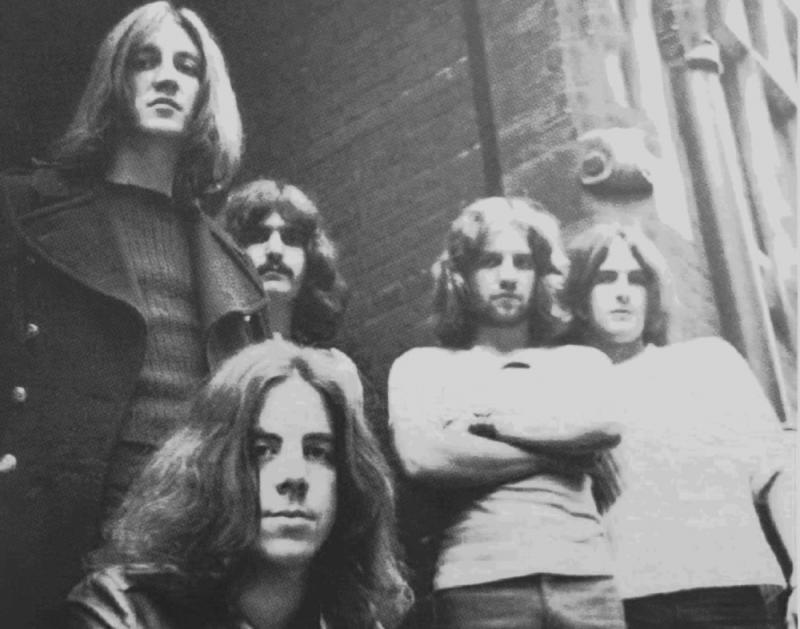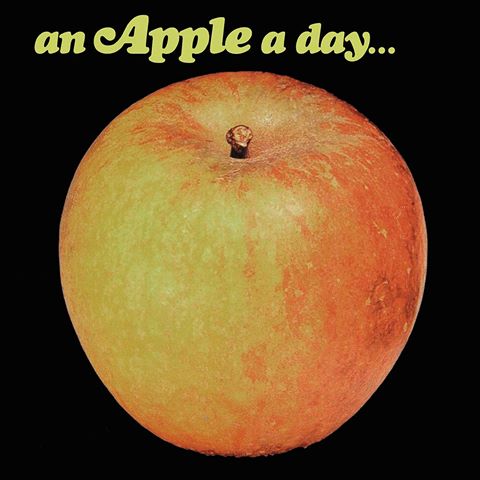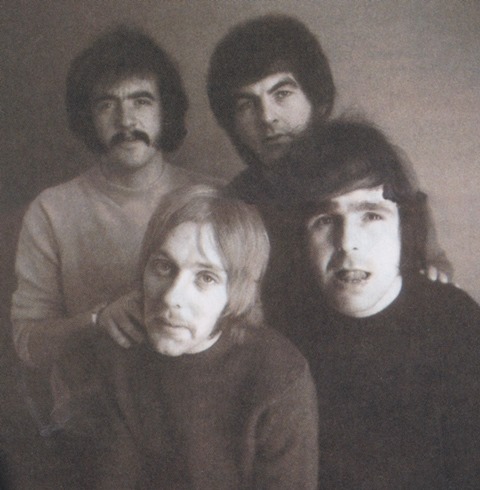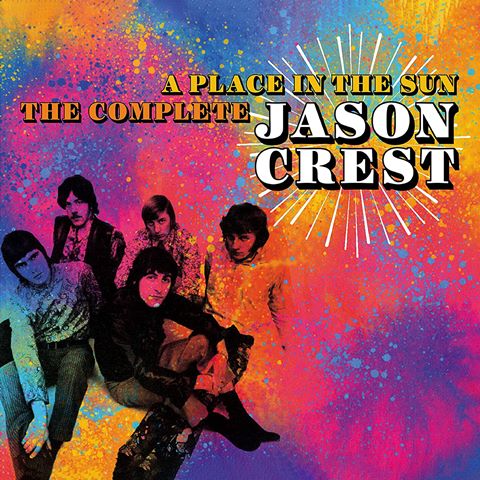Reissue CDs Weekly: Apple, Jason Crest | reviews, news & interviews
Reissue CDs Weekly: Apple, Jason Crest
Reissue CDs Weekly: Apple, Jason Crest
Last-word collections dedicated to belatedly feted Brit-psych underachievers

After their final records were released in 1969, that seemed to be it for Apple and Jason Crest. Releases by both psychedelic-leaning British bands had first hit shops the previous year, and neither oufit made any waves commercially. Of course, that wasn’t the end of the story.
Just over a decade later, Apple’s dark, mysterious “The Otherside” featured on 1980’s seminal-for-real compilation Chocolate Soup For Diabetics. Gathered alongside it were equally extraordinary but barely known gems such as Tintern Abbey’s “Vacuum Cleaner” and Dantalian's Chariot’s “The Madman Running Through The Fields”. Next, Apple’s pop-psych winner “Buffalo Billy Can” was on Chocolate Soup For Diabetics Volume 2 in 1981. Jason Crest’s thrilling, wild B-side “Black Mass” was first reissued on a couple of compilations in 1983 and 1984. Their debut A-side “Turquoise Tandem Cycle” was collected on a further comp in 1987. In the Eighties, both previously unlauded bands were elevated into the psychedelic pantheon. Each, it was clear, had more than one track which came up with the goods.
 Now, decades after the rediscoveries, a couple of CD releases have arrived which must be the last word on each band. Apple’s sole album An Apple A Day reappears as a digi-pack CD with the stereo album supplemented by the mono single versions of tracks it included (they issued two singles). A Place In The Sun – The Complete Jason Crest supplements their five singles with tracks from acetates, and goes further than the 1998 comp Collected Works Of Jason Crest by having a second disc of previously unheard tracks made to secure radio sessions.
Now, decades after the rediscoveries, a couple of CD releases have arrived which must be the last word on each band. Apple’s sole album An Apple A Day reappears as a digi-pack CD with the stereo album supplemented by the mono single versions of tracks it included (they issued two singles). A Place In The Sun – The Complete Jason Crest supplements their five singles with tracks from acetates, and goes further than the 1998 comp Collected Works Of Jason Crest by having a second disc of previously unheard tracks made to secure radio sessions.
Apple’s 1969 album An Apple A Day is intermittently terrific but as the liner notes explain it was issued without their input and included demo recordings and pointless cover versions. The band’s Jeff Harrad says of the demos that “we weren’t happy at all that these tracks had suddenly become our debut album. [Fellow band member] Charlie Barber in particular was a perfectionist, and he was disgusted. When we were given copies of the album, he took the album out of the sleeve, got hold of a pin and scratched across the tracks he’d written so that they couldn’t be played!”
 Adding to the insults, An Apple A Day was issued as a tie-in with promo body The Apple and Pear Development Council. A leaflet for said marketing organisation was included with copies. The band were rendered irrelevant to the record bearing their name – one they had chosen before The Beatles had set up Apple. (pictured left, Apple)
Adding to the insults, An Apple A Day was issued as a tie-in with promo body The Apple and Pear Development Council. A leaflet for said marketing organisation was included with copies. The band were rendered irrelevant to the record bearing their name – one they had chosen before The Beatles had set up Apple. (pictured left, Apple)
Even so, at its best An Apple A Day was fantastic. “The Otherside” is breathtakingly other. “Buffalo Billycan” is as good, but more like psychedelic pop-rock as it was known. “Doctor Rock” and “Let’s Take A Trip Down The Rhine” are almost as good. “Mr. Jones” and “Pretty Girl Love You” are on the way to such greatness.
Jason Crest did not issue an album, but their five singles give a good idea of what it might have been. Their debut, "Turquoise Tandem Cycle", was pop-psych in a “Whiter Shade of Pale” way. Mostly, they veered between that and a Small Faces-ish approach. Superb. The outlier amongst what was issued is “Black Mass”, a recording so over-the-top their label did not want to release it. An nth-degree inversion of Deep Purple’s “Hallelujah", it’s a wigged-out marvel (an unreleased longer version is also collected: presumably a Nineties creation as it’s edited to repetitively highlight specific beats for esoteric dance-floor action). Jason Crest also left unreleased acetates of completed studio recordings, all of which are included. All are top-notch pop-psych.
 What’s new with A Place In The Sun are the tracks on the second disc: two discrete sets of audition recordings from late 1968 and October 1969, made to secure radio sessions. The liner notes do not say who commissioned them, but notes that getting onto BBC Radio One was the goal. While rounding out the picture, these tracks don’t represent the Jason Crest listeners have grown to love since the 1980s.
What’s new with A Place In The Sun are the tracks on the second disc: two discrete sets of audition recordings from late 1968 and October 1969, made to secure radio sessions. The liner notes do not say who commissioned them, but notes that getting onto BBC Radio One was the goal. While rounding out the picture, these tracks don’t represent the Jason Crest listeners have grown to love since the 1980s.
On the first set of tracks, a version of José Feliciano’s interpretation of “California Dreaming” is OK and a Vanilla Fudge-style “Paint It, Black” is less OK. On the second set, an aural photocopy of “Come Together” isn’t great. Also on the second, four self-penned songs suggest they were heading in a rockier, Spooky Tooth direction (one of the tracks is a cover of Spooky Tooth’s “‘Better by me, Better Than You”). Excepting the extended “Black Mass”, Disc One catches Jason Crest at their best.
Realistically, Apple or Jason Crest could not have been huge. Despite the quality of what came out, both began releasing records in 1968 as the edge was coming off psychedelia. Also, their labels weren't positioned to undertake the necessary promotion to their natural markets. Apple split shortly after the release of An Apple A Day and members of Jason Crest went on to join and form other bands in 1970. Whatever their lack of commercial success remember Apple and Jason Crest this way, when they were integral to the patchwork of British psychedelia.
- Next week: Mancunian punks Slaughter & The Dogs
- More reissue reviews on theartsdesk
- Kieron Tyler’s website
Explore topics
Share this article
The future of Arts Journalism
You can stop theartsdesk.com closing!
We urgently need financing to survive. Our fundraising drive has thus far raised £49,000 but we need to reach £100,000 or we will be forced to close. Please contribute here: https://gofund.me/c3f6033d
And if you can forward this information to anyone who might assist, we’d be grateful.

Subscribe to theartsdesk.com
Thank you for continuing to read our work on theartsdesk.com. For unlimited access to every article in its entirety, including our archive of more than 15,000 pieces, we're asking for £5 per month or £40 per year. We feel it's a very good deal, and hope you do too.
To take a subscription now simply click here.
And if you're looking for that extra gift for a friend or family member, why not treat them to a theartsdesk.com gift subscription?
more New music
 Emily A. Sprague realises a Japanese dream on 'Cloud Time'
A set of live improvisations that drift in and out of real beauty
Emily A. Sprague realises a Japanese dream on 'Cloud Time'
A set of live improvisations that drift in and out of real beauty
 Trio Da Kali, Milton Court review - Mali masters make the ancient new
Three supreme musicians from Bamako in transcendent mood
Trio Da Kali, Milton Court review - Mali masters make the ancient new
Three supreme musicians from Bamako in transcendent mood
 Hollie Cook's 'Shy Girl' isn't heavyweight but has a summery reggae lilt
Tropical-tinted downtempo pop that's likeable if uneventful
Hollie Cook's 'Shy Girl' isn't heavyweight but has a summery reggae lilt
Tropical-tinted downtempo pop that's likeable if uneventful
 Pop Will Eat Itself's 'Delete Everything' is noisy but patchy
Despite unlovely production, the Eighties/Nineties unit retain rowdy ebullience
Pop Will Eat Itself's 'Delete Everything' is noisy but patchy
Despite unlovely production, the Eighties/Nineties unit retain rowdy ebullience
 Music Reissues Weekly: The Earlies - These Were The Earlies
Lancashire and Texas unite to fashion a 2004 landmark of modern psychedelia
Music Reissues Weekly: The Earlies - These Were The Earlies
Lancashire and Texas unite to fashion a 2004 landmark of modern psychedelia
 Odd times and clunking lines in 'The Life of a Showgirl' for Taylor Swift
A record this weird should be more interesting, surely
Odd times and clunking lines in 'The Life of a Showgirl' for Taylor Swift
A record this weird should be more interesting, surely
 Waylon Jennings' 'Songbird' raises this country great from the grave
The first of a trove of posthumous recordings from the 1970s and early 1980s
Waylon Jennings' 'Songbird' raises this country great from the grave
The first of a trove of posthumous recordings from the 1970s and early 1980s
 Lady Gaga, The Mayhem Ball, O2 review - epic, eye-boggling and full of spirit
One of the year's most anticipated tours lives up to the hype
Lady Gaga, The Mayhem Ball, O2 review - epic, eye-boggling and full of spirit
One of the year's most anticipated tours lives up to the hype
 Slovenian avant-folk outfit Širom’s 'In the Wind of Night, Hard-Fallen Incantations Whisper' opens the door to inner space
Unconventional folk-based music which sounds like nothing else
Slovenian avant-folk outfit Širom’s 'In the Wind of Night, Hard-Fallen Incantations Whisper' opens the door to inner space
Unconventional folk-based music which sounds like nothing else
 'The Art of Loving': Olivia Dean's vulnerable and intimate second album
Neo soul Londoner's new release outgrows her debut
'The Art of Loving': Olivia Dean's vulnerable and intimate second album
Neo soul Londoner's new release outgrows her debut
 Music Reissues Weekly: The Peanut Butter Conspiracy - The Most Up Till Now
Definitive box-set celebration of the Sixties California hippie-pop band
Music Reissues Weekly: The Peanut Butter Conspiracy - The Most Up Till Now
Definitive box-set celebration of the Sixties California hippie-pop band

Add comment